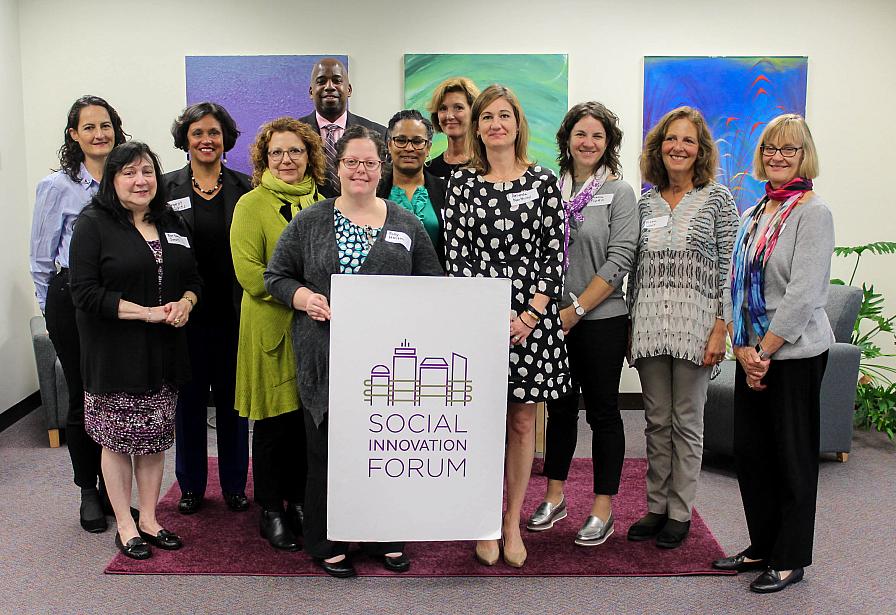
Margaret Leipsitz and Capacity Camp participants from East Boston Ecumenical Center, Project Hope, Project Place, Saint Francis House Inc., South Boston en Acción, Strive, and United South End Settlements
Congratulations to our 2026 Social Innovators!

Margaret Leipsitz and Capacity Camp participants from East Boston Ecumenical Center, Project Hope, Project Place, Saint Francis House Inc., South Boston en Acción, Strive, and United South End Settlements
Nonprofit leaders are stretched between multiple priorities including community needs, supporting staff, fundraising goals, engaging boards, and maintaining buildings. This summer, I had the pleasure of beginning work with the Social Innovation Forum (SIF) to support a group of seven nonprofit leaders to hone their skills and to refresh, reflect, and plan for the year. This “Capacity Camp,” which will continue through April of 2019, was sponsored by the State Street Foundation to support the professional growth of grantees they have funded in the area of workforce development in Boston.
While the participating organizations all provide workforce development programs, the focus of their training, the populations they serve, their location, and the size of their organizations differ greatly. Despite differences in program design, these leaders share many common areas of interest for professional development. Based on their input, a series of half-day interactive group sessions with experts provided more in-depth guidance, including:
In addition, SIF recently matched each participant with a certified Executive Coach to work on specific individual goals and to create an actionable roadmap toward implementation. The process includes a 360-degree review process and some sort of personality evaluation. Through the Capacity Camp, State Street offered its grantees scheduled and structured time to breathe and work on their professional development. Participants benefit from the opportunity to get to know peers facing similar challenges and with whom they can connect with in the future. In addition, pairing with an individual coach can help participants focus on their personal development. Taking place over the course of six months, the sessions and coaching provide a manageable time frame to accomplish the leaders’ individual goals.
One of my favorite memories from a session was watching participants get up in front of the group and give their elevator pitch. The group listened attentively and gave excellent feedback. While I have worked with many clients on presentation skills individually, there is no substitute for a group of peers offering feedback based on their own real life experience.
While nonprofit leaders often see themselves in competition with each other for resources, the Capacity Camp helps build bridges between organizations.
During every session, the participants had informal conversations about how they were dealing with issues from developing capital campaigns to helping to find employment opportunities for their participants, from how to access childcare for the parents in their programs to dealing with the immigration and housing issues their participants face. This opportunity to connect is invaluable. While nonprofit leaders often see themselves in competition with each other for resources, the Capacity Camp helps build bridges between organizations. Participants gain a better understanding of the specialized role they each play in creating employment-training opportunities for Boston residents.
While funders need to be focused on helping individual nonprofits achieve their goals, I have learned through my experience with the Capacity Camp that they can also have a role in building organizations’ connections. Each leader and organization is unique, and their circumstances are different and ever-changing, so there is not a one-size-fits-all approach. State Street’s partnership with SIF has created a two-pronged model with group and individual support that has multiple advantages to nonprofits big and small. The benefits are twofold – greater capacity for individual leaders and a more integrated community of nonprofits who can call on each other for support and collaboration.
Margaret Leipsitz has been consulting with the Social Innovation Forum for 2.5 years and has worked closely with Social Innovators Boston CASA and Partners for Youth with Disabilities in the Social Innovator Accelerator. Margaret has a long history of supporting nonprofits and funders in Boston, focusing especially on workforce development.